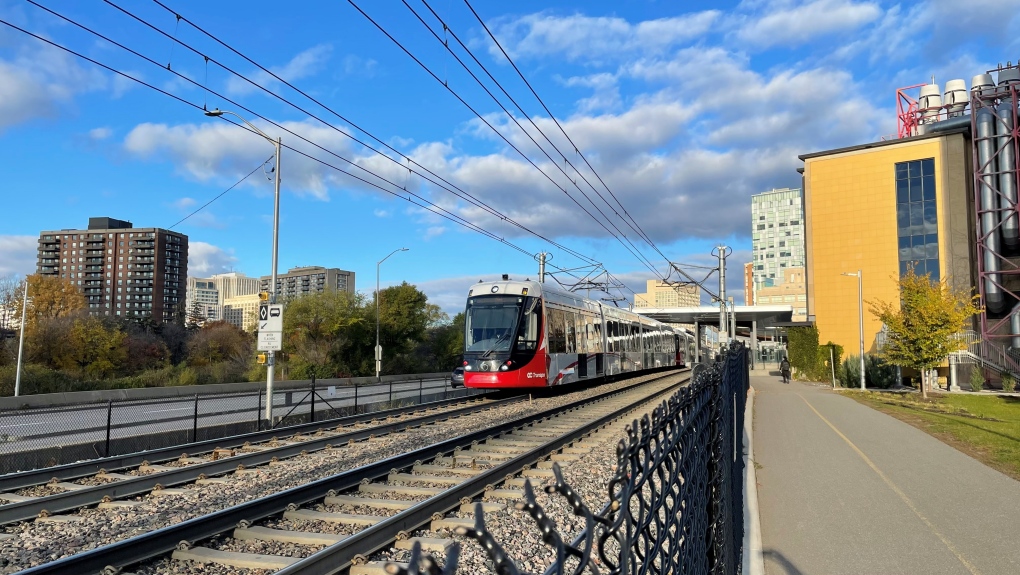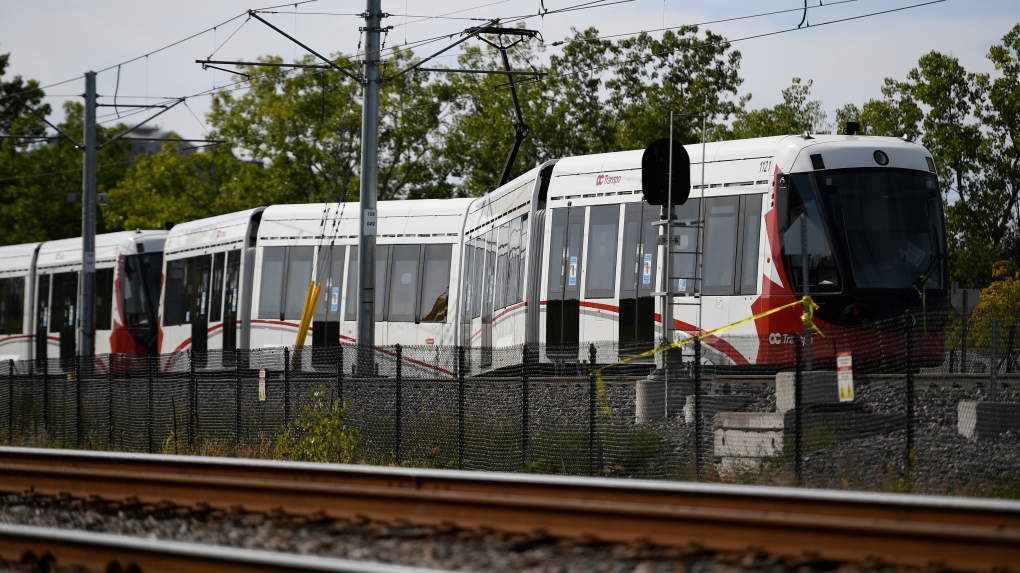
LRT service has 'turned the corner' following 54-day shutdown, Mayor Watson says
 An LRT train near uOttawa station on Thursday, Nov. 4, 2021. OC Transpo began simulating regular service on the line on Thursday. (Josh Pringle/CTV News Ottawa)
An LRT train near uOttawa station on Thursday, Nov. 4, 2021. OC Transpo began simulating regular service on the line on Thursday. (Josh Pringle/CTV News Ottawa)
Mayor Jim Watson believes Ottawa's 28-month-old light rail transit system has "turned the corner" and providing better service to customers following two derailments in six weeks this summer.
In a year-end interview with CTV News Ottawa chief anchor Graham Richardson, Watson said the 54-day shutdown of the LRT system was "a very challenging time" for the city.
"Up until those two derailments in August and September, we had about a year and a half of very good service – 98.5 (per cent), I think, reliability. But then those two incidents came and it hurt the credibility of the organization, of the consortium and the public were just fed up, who were having to go on to R1 buses," said Watson.
"We've turned the corner, I believe, with a new safety team in place, a new management team and we've now seen about six or seven weeks of very good service on Confederation Line. But we need not just six or seven weeks, we need six or seven months, then six or seven years of very good service."
On Aug. 8, an LRT car derailed near Tunney's Pasture Station and the Confederation Line was shutdown for five days while the fleet of cars were inspected. An investigation concluded issues with the axle bearing assembly was to blame.
On Sept. 19, an LRT car with 12 passengers onboard derailed near Tremblay Station and continued westbound, damaging the car, the track and transit infrastructure. The Transportation Safety Board concluded "inconsistent and incomplete maintenance" was to blame for the derailment that shutdown the system for 54 days. Partial service resumed on Nov. 12, and 11 cars were running during peak periods over the holidays.
"When people are on the train and it's working well and it's on schedule and it's well maintained, it's a very good service," said Watson. "That service will get even better when we go further east, west and south with Phase 2."
The city of Ottawa hired Philadelphia-based firm TRA Inc. to oversee the return-to-service plan from Rideau Transit Maintenance.
On Nov. 17, the Ontario government called a public inquiry into Ottawa's LRT system. Justice William Hourigan has been appointed to lead the public inquiry, with a report expected to be released in August 2022.
Richardson asked the mayor if he's worried the issues with the LRT system will impact his legacy.
"I think people in five or 10 years will look back and say, notwithstanding the fact that it got off to a very rough start, the fact of the matter is it was city changing, city building," said Watson.
"We couldn't put any more buses on Slater and Albert, it reached capacity at 8,000 people an hour. We now have capacity for 24,000 people an hour coming in and out of the downtown core. When you see development taking place, apartment buildings sprouting up beside the Blair Station in the east end by the Gloucester Centre, those were built there because you could walk a two-minute walk to the LRT station. So it will be transformative."
 An OC Transpo O-Train is seen west of Tremblay LRT Station In Ottawa on Monday, Sept. 20, 2021 after it derailed on Sunday. (Justin Tang/THE CANADIAN PRESS)
An OC Transpo O-Train is seen west of Tremblay LRT Station In Ottawa on Monday, Sept. 20, 2021 after it derailed on Sunday. (Justin Tang/THE CANADIAN PRESS)
LEGACY
Watson announced earlier this month that he would not seek re-election in the October 2022 municipal election, ending his three-term run as mayor of Ottawa.
Richardson asked Watson if things have been more difficult for him to accomplish during his third term compared to his first term in 2010 to 2014.
"The fact of the matter is we passed our 12th budget, which was a budget that I worked on with the city manager that was based on my campaign commitment that I fought hard to include it in my platform that we could keep a tax cap so that people would know what the tax bill is going to be," said Watson.
The 2022 budget includes a three per cent property tax hike, and a 2.5 per cent hike in transit fares once 15 trains are running on the Confederation Line for one month.
Watson notes that when he was elected mayor in 2010, council had previously approved a nearly four per cent property tax hike and a 7.5 per cent hike in transit fares.
"We brought some fiscal stability to the organization, first and foremost," said Watson.
"There's no question when you lead an organization you've got people who work well with you and others that don't work well, that's democracy. The vast majority of votes at city council in fact are unanimous; it's the big issues that obviously are often very divisive."
The mayor says Council has gotten a lot of projects off the ground during his tenure as mayor; including LRT, the Lansdowne Park redevelopment, pedestrian bridges, the Vimy Memorial Bridge and the Ottawa Arts Court.
"Legacy is something that you leave once you're six feet under and chisel it on your gravestone, so I don't worry about that," said Watson when asked if he hopes he's remembered for all the projects started while he was mayor.
"I think people will look back and say, 'You know what, he got a lot of stuff done that is good for the city.'"
You can watch CTV News Ottawa chief anchor Graham Richardson's year-end interview with Mayor Jim Watson during CTV News at Six Monday and Tuesday.
CTVNews.ca Top Stories

Grandparents killed in wrong-way crash on Hwy. 401 identified
A 60-year-old man and a 55-year-old woman killed in a wrong-way crash on Highway 401 earlier this week have been identified by the Consulate General of India in Toronto.
Police arrest 3 Indian nationals in killing of B.C. Sikh activist Hardeep Singh Nijjar
Three people have been arrested and charged in the killing of B.C. Sikh activist Hardeep Singh Nijjar – as authorities continue investigating potential connections to the Indian government.
Suter scores late goal, clinches series for Canucks
Pius Suter scored with 1:39 left and the Vancouver Canucks advanced to the second round of the NHL playoffs with a 1-0 victory over the Nashville Predators on Friday night in Game 6.
TD worst-case scenario more likely after drug money laundering allegations: analyst
TD Bank Group could be hit with more severe penalties than previously expected, says a banking analyst after a report that the investigation it faces in the U.S. is tied to laundering illicit fentanyl profits.
Quebec man who threatened Trudeau, Legault online sentenced to 20 months in jail
A Quebec man who pleaded guilty to threatening Prime Minister Justin Trudeau and Premier François Legault has been sentenced to 20 months in jail.
Human remains found in rural Sask. possibly a decade old, RCMP say
RCMP say human remains found in a rural area in central Saskatchewan may have been there for a decade or more.
Britney Spears 'home and safe' after paramedics responded to an incident at the Chateau Marmont, source tells CNN
A source close to singer Britney Spears tells CNN that the pop star is 'home and safe' after she had a 'major fight' with her boyfriend on Wednesday night at the Chateau Marmont in West Hollywood.
Canadian doctor concerned new weight-loss drug Wegovy may be used inappropriately
As Wegovy becomes available to Canadians starting Monday, a medical expert is cautioning patients wanting to use the drug to lose weight that no medication is a ''magic bullet,' and the new medication is meant particularly for people who meet certain criteria related to obesity and weight.
Drew Carey is never quitting 'The Price Is Right'
Drew Carey took over as host of 'The Price Is Right' and hopes he’s there for life. 'I'm not going anywhere,' he told 'Entertainment Tonight' of the job he took over from longtime host Bob Barker in 2007.






























